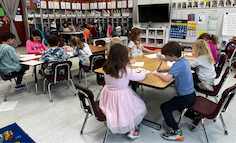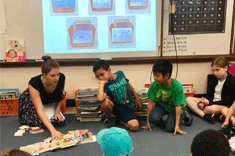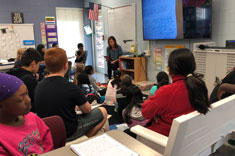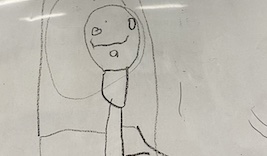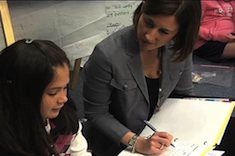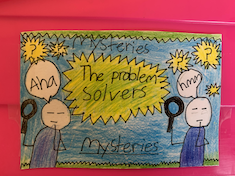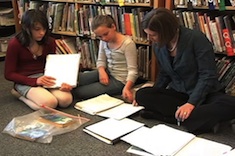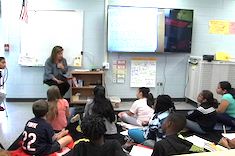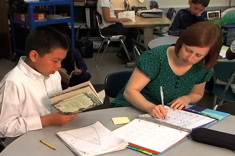3rd Grade
Latest Videos
Developing a Mindset for Looking at Student Writing
This PD2Go focuses on intentionally developing a mindset for looking at student writing by pairing an article by Heather Fisher and a Quick Take video by Ruth Ayres.
Tools to Support Our Youngest Readers
This PD2Go focuses on the importance of listening to students, especially when they have different answers.
One-Page Reading Response to Assess Theme
This PD2Go focuses on giving a practical approach to assessing students' understandings of theme by using a one-page reading response by pairing an article by Christy Rush-Levine with a minilesson video with Dana Murphy.
Our Words Matter: Intentionally Uplifting Student Voices
This PD2Go focuses on intentionally uplifting student voices by pairing an article by Becca Burk and a conference with Dana Murphy. Becca Burk reflects on the power of intentional language...
Teaching Character Traits
This PD2Go focuses on digging deeper into defining character traits by pairing a conference led by Clare Landrigan with an article about analyzing character traits by Gigi McAllister. Gigi McAllister shares...
Claiming a Reading Identity
Keeping excitement for the next book to read can be a challenge. This session offers two ideas to sustain energy for independent reading. Melissa Quimby shares a creative and practical idea for students to name their reading identities. Christy Rush-Levine offers a tried-and-true practice of offering book talks so students can create a robust "To Be Read" list.
Reimagining Reading Logs
Reading logs are a part of many classrooms. This session carves out space for teachers to consider the purpose of reading logs. Clare Landrigan makes the comparison between reading logs and running logs in a demonstration lesson. A choice of articles is given for participants to think more deeply about the purpose of reading logs.
Onward! Reflection and Goal Setting
Reflective practice and goal setting are important practices for educators. Jen Schwanke leads the way in encouraging a positive mindset and reflective practice anchored in gratitude. When paired with Jaz...
Digital Reading Strategies
As we encounter more digital texts, we must consider the reading strategies needed to understand them. In this session, participants will reflect on their own reading lives and identities as...
Scaffolding Research with Text Sets
Sometimes students have a difficult time learning to research in efficient ways. Text sets are one way to scaffold the research process for students who are preparing to write informative...
Response to Read Aloud
Tammy Mulligan enhances the quality of the class read aloud and student discussions with the use of a whole-class response notebook. Franki Sibberson shares how she integrates student choice and...
Teaching Students How to Give Revision Suggestions
ARTICLE: Franki Sibberson shares a lesson progression to help students learn how to give helpful revision feedback. She uses online videos and resources to support her work. VIDEO: Dana Murphy...
Homework Challenges
This professional development session is designed to help participants explore the concept of weekly “homework challenges,” as well as to consider what is working well with their homework program and...
Assessing in the Midst: Using Charts and Exit Slips
Melanie Meehan shares some ways teachers can press the pause button in the midst of teaching to assess whether they are teaching the right lesson at the right time. The...
Better Family Communication
Gigi McAllister gives a brief explanation of how her thinking on goal setting has changed, as well as the ways in which she uses student goals to connect with parents. Max Brand shares strategies for helping parents talk with students.
Building Identity and Community
Katherine Sokolowski shares a wall display from her fifth graders that students build to celebrate who they are and people they love from home. The reading is from Suzy Kaback, explaining the value of an "All About Us" board in classrooms.
Scaffolding Partner Work
Katherine Sokolowski scaffolds fifth graders Liam and Caden through the process of learning to recommend books to each other. The workshop includes reading from Tara Barnett and Kate Mills with suggestions for fostering better partnerships through student-created "want ads."
Post It Prove It
Leslie Lloyd preserves instructional time by having her third-grade students share their Post It Prove It notes on a bulletin board throughout the reading workshop. Click here to download the...
Launching and Sustaining Writers’ Notebooks
Ruth Ayres confers with third grader Jade about the value of collecting ideas in her writer’s notebook, and shares some strategies for organizing the information. Click here to download the...
Analyzing Poetry in Third Grade
Leslie Lloyd's third graders analyze literal and figurative language (which they describe as “nonliteral”) in Donald Graves's poem "Bully."
Inferring and Synthesis: Conferring Over Series Books
Beth Lawson shows how to get the most from a conference about series books in third grade. Inferring and synthesis are discussed, as well as the use of written notes for making meaning from texts.
Grade Level
Browse Videos By
Instructor
- Melissa Quimby
- Nawal Qarooni
- Gwen Blumberg
- Julie Cox
- The Lead Learners
- Hannah Tills
- Josie Stewart
- Ruth Metcalfe
- Mallory Messenger
- Becca Burk
- Jodie Bailey
- Vivian Chen
- Mary Brower
- Tiffany Abbott Fuller
- Stephanie Affinito
- Ruth Ayres
- Leigh Anne Eck
- Heather Fisher
- Shari Frost
- Julie Johnson
- Suzy Kaback
- Gigi McAllister
- Shirl McPhillips
- Melanie Meehan
- Cathy Mere
- Debbie Miller
- Tara Barnett and Kate Mills
- Tammy Mulligan
- Dana Murphy
- Bitsy Parks
- David Pittman
- Brenda Power
- Heather Rader
- Matt Renwick
- Mandy Robek
- Christy Rush-Levine
- Gretchen Schroeder
- Jen Schwanke
- Brian Sepe
- Katherine Sokolowski
- Stella Villalba
- Jennifer Vincent
Choice Literacy Membership
Articles
Get full access to all Choice Literacy article content
Videos
Get full access to all Choice Literacy video content
Courses
Access Choice Literacy course curriculum and training

